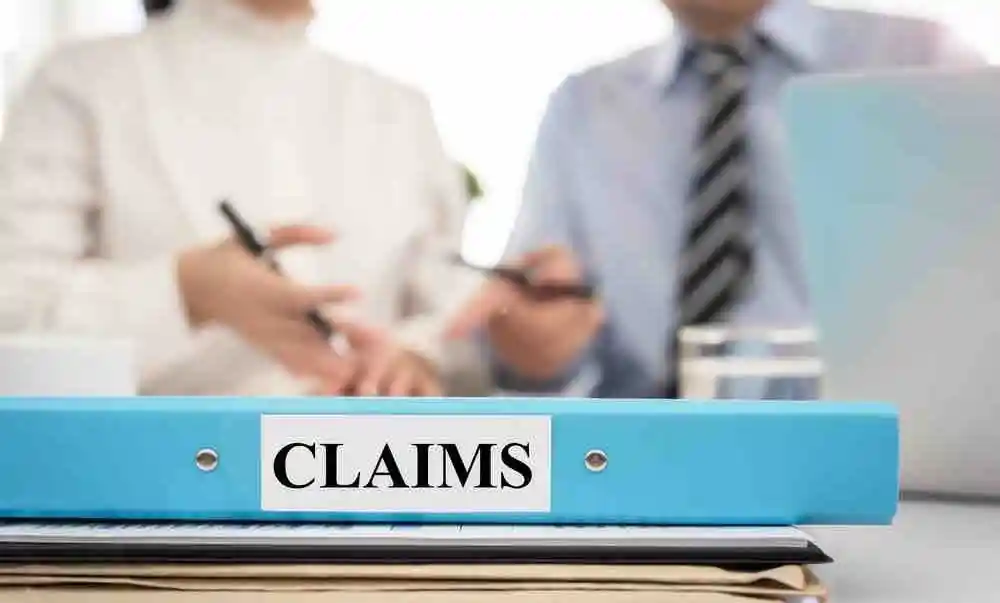Law & Security
How to Successfully File an Insurance Claim Against Another Driver After an Accident

In the aftermath of a car accident, navigating the process of filing an insurance claim against another driver can feel overwhelming. However, with a clear understanding of the necessary steps and a proactive approach, you can streamline this process and ensure fair compensation for damages incurred. Here’s a comprehensive guide on how to effectively file an insurance claim against another driver after an accident:
Assess the Situation Immediately
Immediately following the accident, prioritize assessing the situation for any injuries and ensuring the safety of all involved parties. Contact emergency services if necessary and seek medical attention for injuries. Once safety concerns have been addressed, gather pertinent information regarding the accident.
Gather Essential Information
Exchange insurance information with the other driver involved in the accident. Ensure to collect the following details:
– The full name and contact information of the other driver are needed.
– Insurance company name and policy number.
– Vehicle make, model, and license plate number.
– Location, date, and time of the accident.
– Names and contact information of any witnesses.
Document the accident scene by taking photographs of the vehicles involved, damages sustained, and any relevant road conditions. These visual records serve as valuable evidence during the insurance claim process.
Notify Your Insurance Provider
Promptly notify your insurance company about the accident, providing them with all relevant details and documentation. Be honest and transparent when recounting the events of the accident to your insurance company, as any discrepancies may impede the claims process.
Contact the Other Driver’s Insurance Company
Contact the other driver’s insurance company to initiate the claims process. Provide them with the necessary information, including your version of the events, and submit any documentation or evidence supporting your claim. Be prepared to answer any questions or provide additional information as requested by the insurance adjuster.
Document Damages and Expenses
Keep detailed records of all damages incurred from the accident, including vehicle repairs, medical expenses, rental car costs, and other relevant expenditures. Retain copies of invoices, receipts, medical bills, and repair estimates to substantiate your claim.
Cooperate with the Claims Adjuster
Throughout the claims process, maintain open communication and cooperation with the claims adjuster assigned to your case. Provide timely responses to any inquiries and willingly participate in any investigations or assessments conducted by the insurance company.
Negotiate Fair Compensation
In some cases, insurance companies may offer a lowball settlement amount that does not fully cover your damages. If you believe the settlement is inadequate, don’t hesitate to negotiate for fair compensation. Present evidence supporting your claim and advocate for your rights to ensure a satisfactory resolution.
Consider Legal Assistance
If negotiations with the insurance company reach an impasse or encounter any legal complexities, consider seeking guidance from a qualified attorney specializing in personal injury and insurance claims. An experienced legal professional can provide invaluable support and advocacy throughout the claims process.
Conclusion
Filing an insurance claim against another driver after an accident requires careful attention to detail, proactive communication, and persistence in pursuing fair compensation. By following the steps outlined in this guide and leveraging appropriate resources, you can confidently navigate the claims process and achieve a favorable outcome. Remember to prioritize your safety and well-being above all else and seek assistance
Law & Security
How to Avoid Tax Issues as a Freelancer: Tips for Independent Contractors

Freelancing offers the freedom to work on your terms, but with that freedom comes the responsibility of managing your taxes. Independent contractors often face unique tax challenges that can lead to headaches if not adequately addressed. One of the most effective ways to navigate these challenges is by staying organized and informed. If you’re a freelancer worried about potential tax issues, resources like freedom tax resolution can help guide you through tax-related obstacles and provide peace of mind. In this blog post, we’ll discuss practical steps to help freelancers avoid tax issues and ensure their business complies with tax laws.
Understanding Your Tax Obligations as a Freelancer
Freelancers often operate as sole proprietors or independent contractors, which means they’re responsible for reporting their income and paying taxes on it. Unlike employees who have taxes withheld automatically from their paychecks, freelancers must manage their tax payments. This includes federal income tax, state income tax (if applicable), and self-employment taxes, which cover Social Security and Medicare contributions. One of the first steps in avoiding tax issues is understanding what taxes you need to pay and how much you owe.
Keep Track of Income and Expenses
One of freelancers’ most significant mistakes is failing to keep accurate and organized records. Without detailed records of your income and expenses, filing taxes accurately and taking advantage of deductions becomes tough. Using accounting software or hiring an accountant can help you maintain accurate records throughout the year. At the very least, keep a spreadsheet or use an app to log your income and business expenses.
Remember that the IRS doesn’t distinguish between personal and business expenses regarding income tax. If you use your home for work, for example, you might be able to deduct a portion of your rent or mortgage payment, utility bills, and internet costs. However, this is only possible if you have clear, accurate records to back up these deductions. Freelancers should also be aware that the IRS can audit their tax returns, and having sloppy or incomplete records could increase the likelihood of an audit.
Paying Estimated Taxes
Unlike traditional employees, freelancers must pay their taxes quarterly through estimated payments. These payments are typically due on April 15, June 15, September 15, and January 15. Failure to make these payments can lead to penalties and interest charges, which can quickly add up. Calculating how much you owe each quarter and making your payments on time is crucial.
One common mistake freelancers make is not setting aside enough money for taxes. Since taxes aren’t automatically withheld from their pay, some freelancers don’t realize how much they owe until tax season arrives. A good rule of thumb is to set aside at least 25-30% of your tax earnings. This ensures you won’t be caught off guard when it’s time to pay. If you find it challenging to manage your finances, consulting with a tax professional who can help you estimate how much you should set aside for taxes may be worth it.
Seek Professional Help When Needed
While many freelancers prefer to handle their taxes themselves, seeking professional help can save you time and money in the long run. Tax professionals can assist with understanding complex tax laws, optimizing deductions, and filing taxes correctly. If you’re ever in doubt about your tax situation, it’s worth investing in professional advice.
Additionally, if you’ve made mistakes in your tax filings or owe a significant amount in back taxes, a tax resolution service can help you resolve the issue. Services like Freedom Tax Resolution can guide you through negotiating with the IRS, setting up a payment plan, or even reducing the amount you owe. A professional can ensure you handle tax issues promptly and efficiently, preventing them from snowballing into more significant problems.
Staying Ahead of Changes in Tax Laws
Tax laws constantly evolve, and freelancers must stay current on changes that could impact their tax obligations. For instance, new tax reforms may introduce additional deductions, tax credits, or changes to self-employment taxes. By keeping an eye on these updates, freelancers can adjust their tax strategies accordingly.
Conclusion
As a freelancer, managing taxes effectively is essential for long-term financial stability. Understanding your tax obligations, keeping accurate records, paying estimated taxes, seeking professional help when needed, and staying informed about tax law changes are all key components of avoiding tax issues. By staying organized and proactive, you can minimize the risk of tax problems and focus on growing your freelance business. Suppose you ever find yourself in a situation where tax issues arise. In that case, services like Freedom Tax Resolution are available to help you navigate the complexities of tax resolution and ensure that your financial health remains intact.
Law & Security
Top Cybersecurity Practices for Ensuring Business Safety

What would happen if a hacker got into your business’s data?
A single breach could expose customer information, disrupt operations, and cost a fortune to fix. Cyber threats grow more advanced every day, making strong security more important than ever. Businesses must take steps to protect their systems, data, and customers.
Simple but effective practices can reduce risks and keep information safe. Here’s how to build a stronger defense against cyberattacks.
Secure Your Passwords
Passwords are the first line of defense for your business. Make sure they are strong and hard to guess. Avoid using obvious words, names, or numbers.
It’s a good idea to use a mix of letters, numbers, and symbols. Change passwords often and don’t use the same one for everything.
You can also consider using a password manager to keep track of them. If your team has access to important data, ask them to set strong passwords too. Keeping your passwords safe helps protect your business from hackers.
Update Software Regularly
Updating your software regularly is one of the easiest ways to protect your business. Most updates include fixes for security problems that hackers might use to get into your system. Set your devices to update automatically, or check for updates often.
If you use special programs for your business, ask professional IT services to help you keep them up to date. They can make sure everything is running smoothly and securely. Keeping software updated keeps your systems safer from new threats.
Limit Data Access
Limiting who can access your business data helps keep it safe. Only give access to people who need it for their work. For example, someone working on a project only needs the information related to that project.
Don’t let everyone see everything. Instead, set up user roles with different access levels. If a person’s account gets hacked, the damage stays minimal.
Review access permissions regularly. When someone leaves the company, remove their access right away. Limiting data access protects your business from unnecessary risks.
Watch for Phishing Scams
Phishing scams trick people into giving away important information. These scams often come through emails or text messages. They may look real, but they ask for things such as passwords or bank details.
Never click on links in messages you didn’t expect. If something seems off, don’t open attachments or respond.
Train your team to spot scams too. A little caution can stop these attacks before they cause harm. Stay alert, and always question messages that seem suspicious.
Backing Up Important Files
Backing up your important files can save your business from big problems. If something unexpected happens, like a cyberattack or a computer crash, you can restore your data quickly.
It’s a good idea to store backups in more than one place, such as on an external drive and in the cloud. Setting up automatic backups takes the worry out of it, so you don’t have to remember every time.
Just make sure you can access your backups easily, and test them now and then. It’s a simple way to keep your business safe.
Ensure Your Business Safety With These Practices
Keeping your business safe from cyber threats is an ongoing effort. By staying alert and following basic security steps, you can protect your data and build trust with your customers.
It’s important to remember that no system is perfect, but taking action now can help prevent serious problems in the future. Stay proactive, stay informed, and keep your business secure.
Are you looking for other helpful content? If so, stay with us and continue reading for more.
Law & Security
Understanding the Legal Process of Motorcycle Accident Claims

Motorcycle accident claims can be confusing and overwhelming, especially after experiencing a crash. When you’re involved in a motorcycle accident, knowing the right steps to take is crucial for protecting your rights and securing the compensation you deserve. Knowing your rights and the process helps with insurance and accident issues. Read on to learn more.
Immediate Steps to Take After a Motorcycle Accident
When a motorcycle accident occurs, your first priority should always be safety. Ensure you and anyone else involved are safe, and call for medical help if needed. After that, gather evidence at the scene. Here are some steps to consider:
- Call the police and report the accident
- Exchange contact and insurance information
- Document the scene with photos and videos
- Talk to witnesses and get their information
Determining accident liability means figuring out who caused the accident. If you weren’t at fault, you might be entitled to motorcycle injury compensation. In many motorcycle accidents, fault can depend on various factors. These include road conditions, other drivers’ actions, and adherence to traffic laws. It’s essential to gather all evidence and consider consulting a lawyer.
Steps in the Legal Process of Motorcycle Accident Claims
Once fault has been established, the next steps in the legal process can begin. Here are the key stages you’ll typically go through when filing motorcycle accident claims:
Gather Evidence
As mentioned earlier, collecting evidence is crucial. The more proof you have regarding the accident, the stronger your claim becomes.
Notify Your Insurance Company
It’s important to inform your insurance provider about the accident as soon as possible. They will guide you through the next steps and help you understand your coverage options.
File a Claim
After notifying your insurance company, file a claim with them or the other driver’s insurance. Include all documentation and evidence you’ve collected.
Settlement Negotiation
Once the claim is filed, expect to enter a settlement negotiation phase. This can involve discussions with the insurance company that may lead to a settlement amount for your injuries and damages. Be cautious, as the initial offers may be lower than what you deserve.
Legal Action
If the settlement negotiations don’t lead to a satisfactory agreement, you may need to consider legal action. They can represent you and help facilitate the next steps.
Your Rights After a Motorcycle Accident
After a motorcycle accident, you have rights that protect you. These encompass your right to compensation for medical expenses, damage to your motorcycle, lost wages, and pain and suffering. Also, you have the right to negotiate a settlement and challenge any unfair practices from the insurance companies.
Why Legal Help is Crucial
Hiring a personal injury lawyer can significantly influence the outcomes of your motorcycle accident claims. A qualified lawyer understands the legal nuances and can guide you through every step. Additionally, they can negotiate on your behalf during settlement negotiations, working hard to get you the compensation you deserve. Consider reaching out to Dimopoulos Law for advice and support following your accident.
Wrapping Up the Legal Process
Motorcycle accident claims can seem difficult at first, but understanding the process can ease some of your worries. From immediate steps like gathering evidence to negotiating a settlement, these actions are vital for obtaining the compensation you deserve. Remember to seek legal advice if you face challenges along the way. For more helpful tips, check out the rest of our site today.
Read More latest Posts
-

 Travel1 year ago
Travel1 year agoOnboardicafe.com Login Exploring the Delights of Onboardicafe
-

 Food & Recipes12 months ago
Food & Recipes12 months agoFive Food Products You Must Avoid Giving to Your Infant
-

 Sports1 year ago
Sports1 year agoThe Most Popular Sports In The World
-

 Health & Fitness11 months ago
Health & Fitness11 months agoSuboxone Tooth Decay Lawsuits and the Pursuit of Justice Against Indivior
-

 Sports10 months ago
Sports10 months agoSmart Solutions for Football Field Maintenance
-

 Technology5 months ago
Technology5 months agoSustainable Practices in Video Production: Reducing the Carbon Footprint
-

 Entertainment1 year ago
Entertainment1 year agoNavigating the Web: The Ultimate List of Tamilrockers Proxy Alternatives
-

 Sports9 months ago
Sports9 months agoWearable Tech and the Future of Football










